This creamy and luxurious Salmon Fettuccine Alfredo is where tender fish meets homemade rich sauce over perfectly cooked pasta. This is a delectable twist on a classic dish that offers a great balance of savory seafood and velvety sauce.
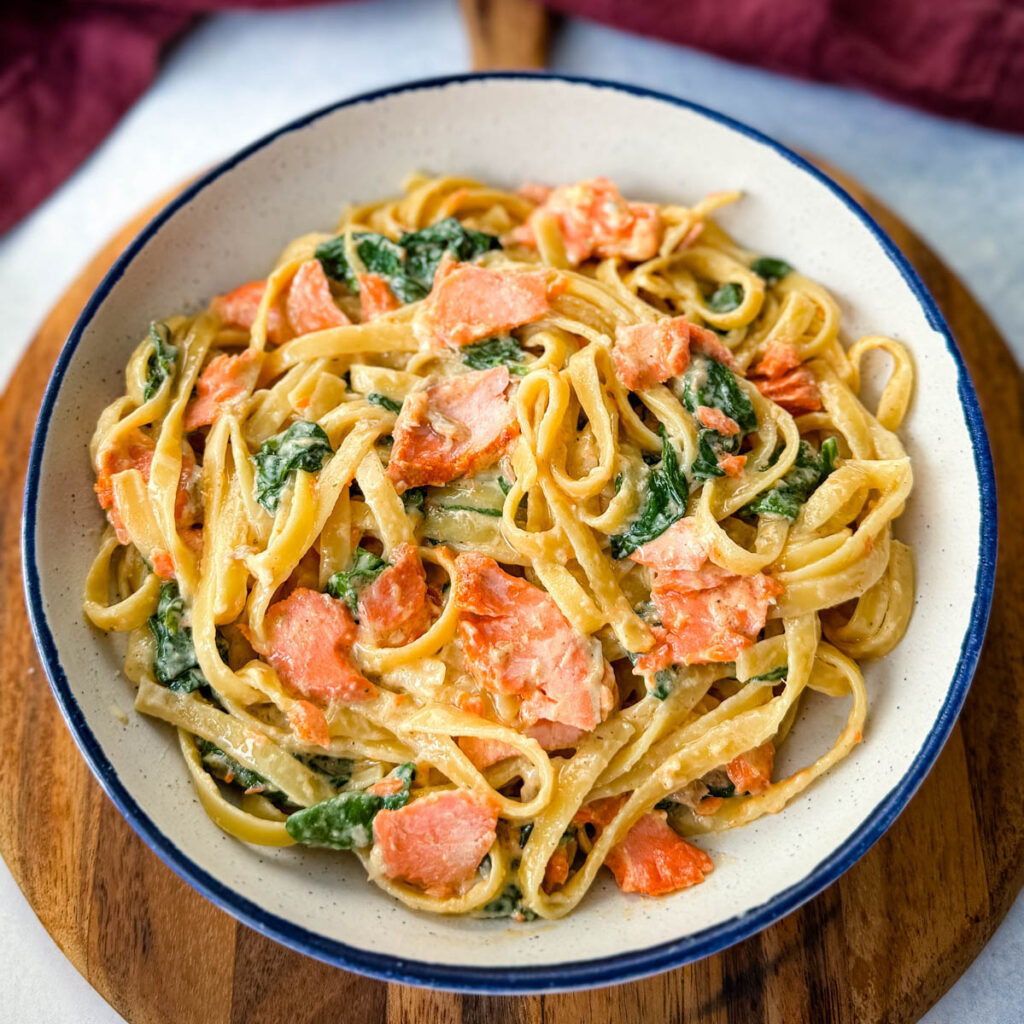
This post contains affiliate links. Please read my full disclosure here.
Key Ingredients
- Olive Oil
- Salmon
- Spices
- Garlic
- Broth
- Heavy Whipping Cream
- Parmesan Cheese
- Pasta
- Spinach
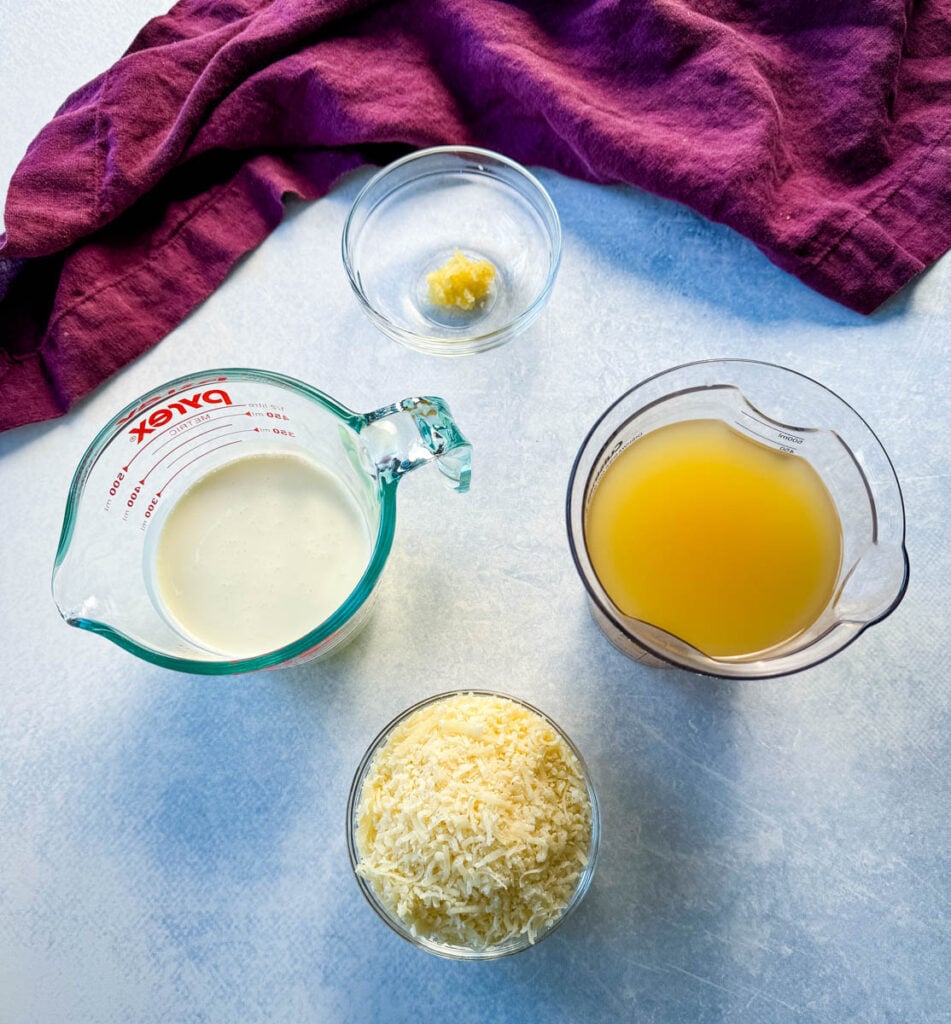
What Type of Salmon to Use
The best type to use is a matter of preference. The most common types of salmon include:
- Wild and/or Sockeye: Known for its deep red color and rich, oily flavor. It is considered one of the most flavorful types of salmon.
- Atlantic: It is farm-raised and has a milder flavor than wild-caught salmon.
- Pink: It is the smallest of the Pacific salmon and has a mild, delicate flavor.
Ultimately, the best type of fresh salmon to use will depend on your taste preferences.
Salmon that is sourced from the Atlantic is usually farmed. Farmed means antibiotics and food coloring (to give it a pink color) are used. This adds harmful chemical additives to the fish. So I usually try to look for wild-caught salmon.
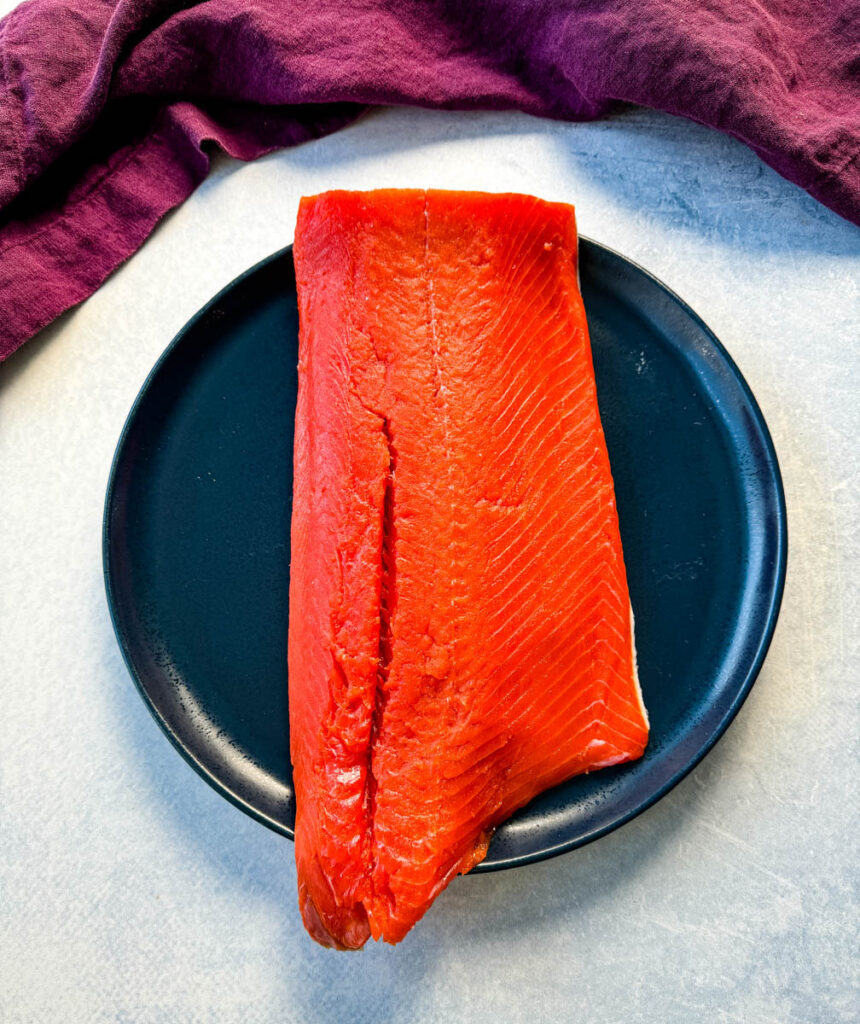
How to Cook the Salmon
What Type of Pasta to Use
Because this dish is made with Alfredo sauce, Fettuccine is a classic choice. Its wide, flat ribbons provide a substantial base that can hold the creamy sauce and complement the richness of the salmon. The wide surface area of fettuccine allows it to capture and cling to creamy sauces. This is one of the best types of pasta to use if you're looking for the pasta to soak up and soak in the sauce.
If you want a slick texture, where the sauce glides off the pasta and leaves the dish super creamy, I recommend spaghetti or angel hair. I use linguine and spaghetti in my Ground Beef Alfredo. Those recipes provide a completely different texture than this one, just because of the pasta. The Alfredo sauce is very similar to the one here.
Keep that in mind when you decide what to use. Here are more options:
- Linguine: It is similar to fettuccine but slightly narrower. The long, flat shape allows it to capture and hold the Alfredo sauce and small salmon pieces effectively.
- Penne: Is a tube-shaped pasta with ridges that can trap the sauce, creating a satisfying bite. It works well if you prefer a pasta shape that holds up to hearty sauces.
- Bowtie (Farfalle): Bowtie pasta adds a playful and visually appealing element to the dish.
- Rigatoni: Rigatoni is a large, ridged pasta that holds sauces exceptionally well. Its structure pairs nicely with the creamy sauce.
- Rotini: These twisted or corkscrew-shaped pasta varieties are good choices for capturing sauce and small bits of salmon.
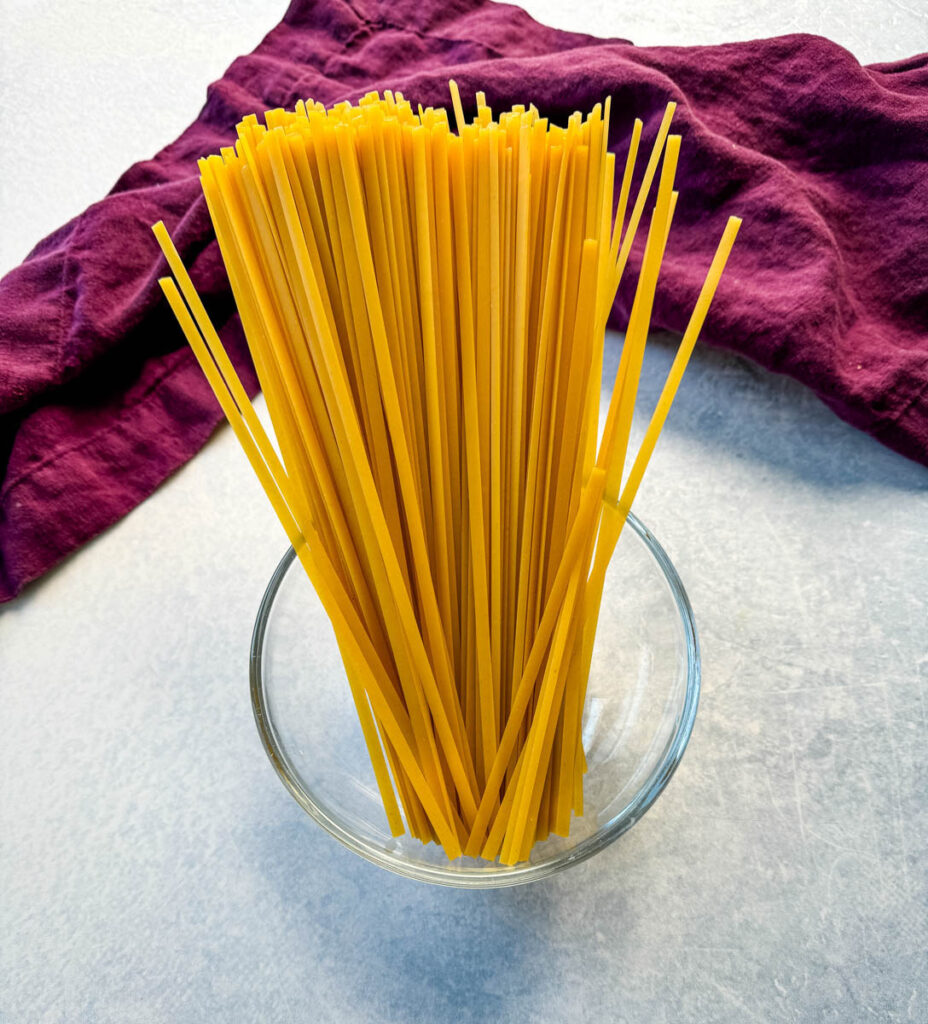
What Type of Cheese to Use
Alfredo sauce is made using Parmesan cheese. Parmesan cheese adds a rich, salty, and nutty flavor to the sauce, which complements the creamy base beautifully. You should also use freshly grated Parmesan cheese for the best flavor and texture, as opposed to pre-shredded bagged cheese.
You can use whatever type of cheese you prefer in this recipe.
Do You Break the Pasta in Half
You don't need to. It will shrink down as it cooks. Long strands of pasta are so much better than short ones. I wouldn't break it.
Quick Method: No Boiling the Pasta
I love to use a no-boil pasta method in this recipe! Feel free to boil your pasta first if that’s what you would like to do. This method allows me to cook the pasta directly in the Alfredo sauce and once I get that going, I season the salmon and get it cooked so that both are ready around the same time.
The method I use in this recipe results in only needing one pot to accomplish it all. You will combine the pasta sauce ingredients in your pan or pot and then add in your pasta and allow your pasta and sauce to simmer until the pasta is tender.
This method allows to sauce to penetrate the pasta as it cooks and also results in immense flavor.
How to Make Salmon Fettuccine Alfredo
Detailed measurements and full instructions can be found in the recipe card at the bottom of this post.
- Season the salmon with olive oil and spices and cook.
- Place a large skillet or pot on the stove at medium-high heat. Add the garlic and cook for 1-2 minutes or until fragrant.
- Add broth, spices, and heavy cream to the pot.
- Once the mixture begins to boil and bubble add in the pasta.
- Once the pasta has wilted and is fully covered in the sauce, adjust the heat to medium and cover the pot.
- Simmer. Sprinkle in the Parmesan cheese and optional spinach. Fold to combine.
- Add in the cooked salmon.
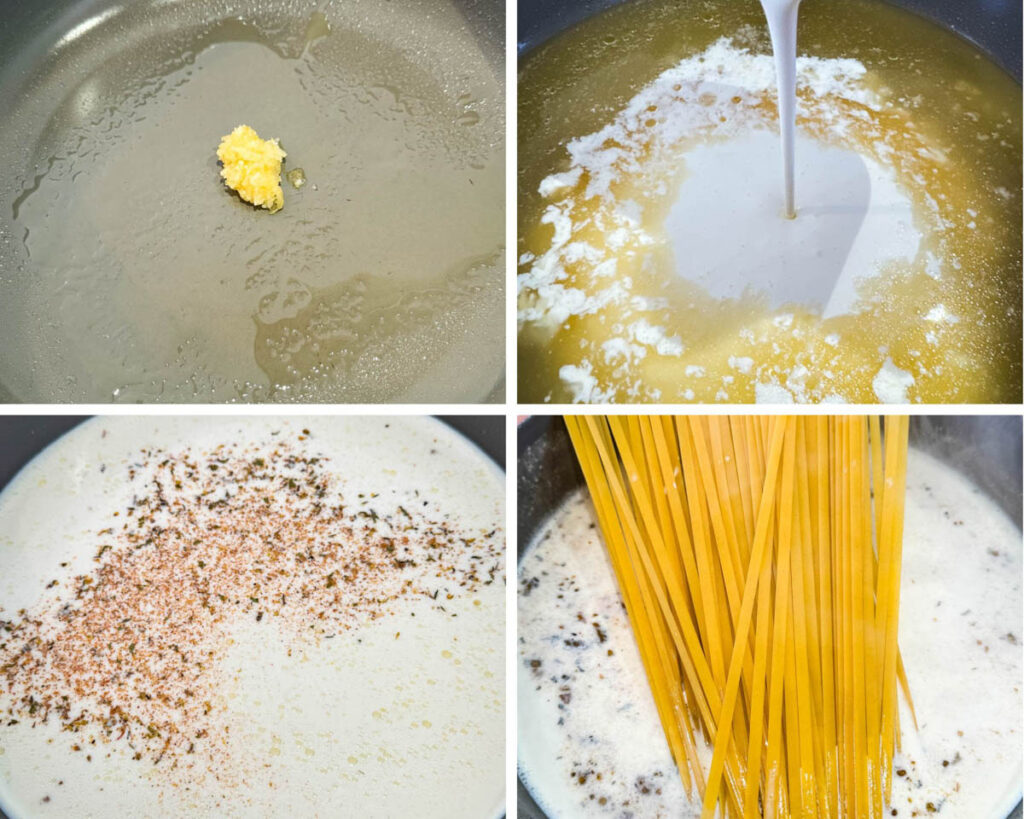
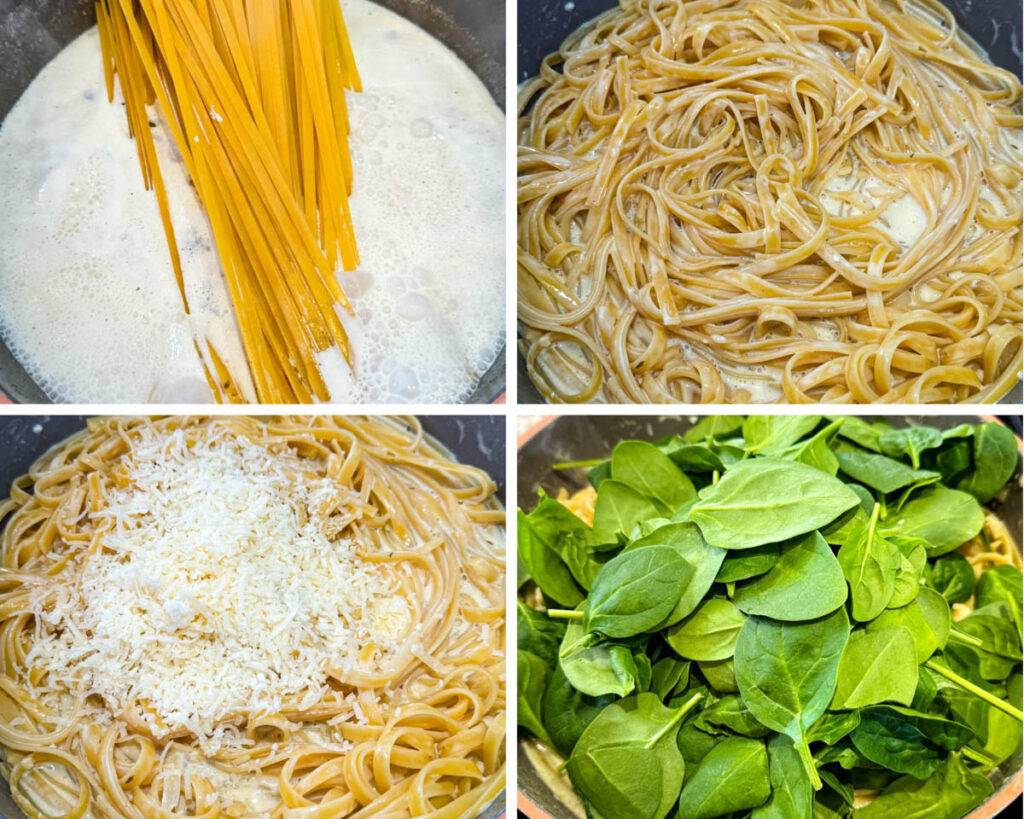
Want to save this recipe for later?
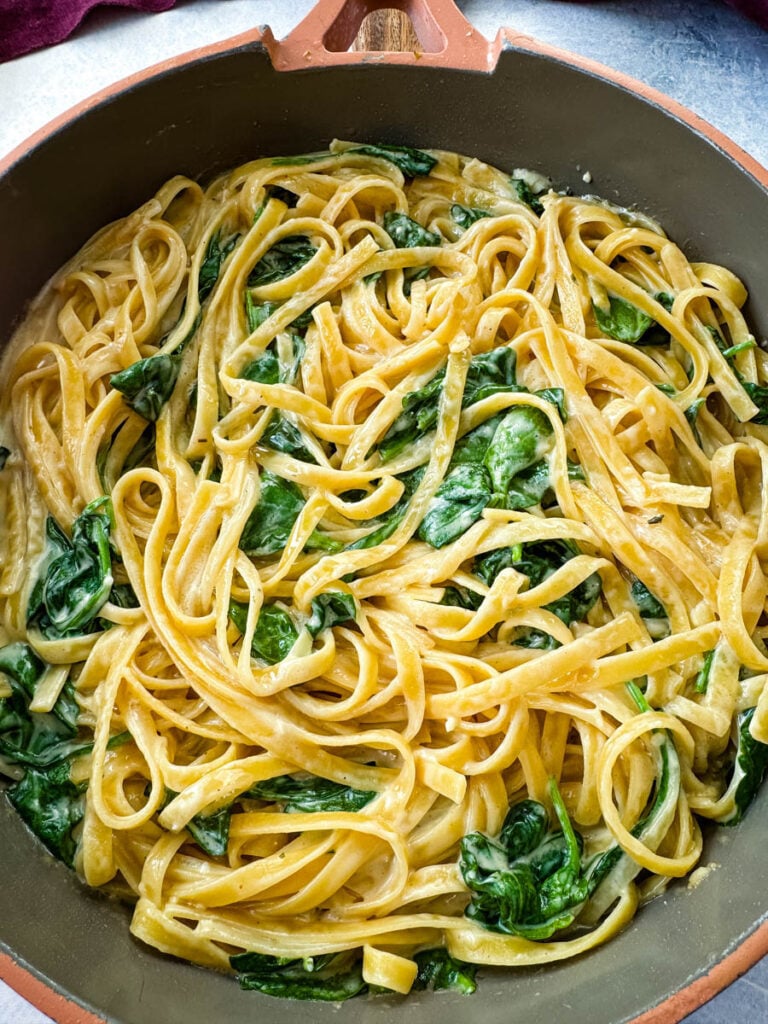
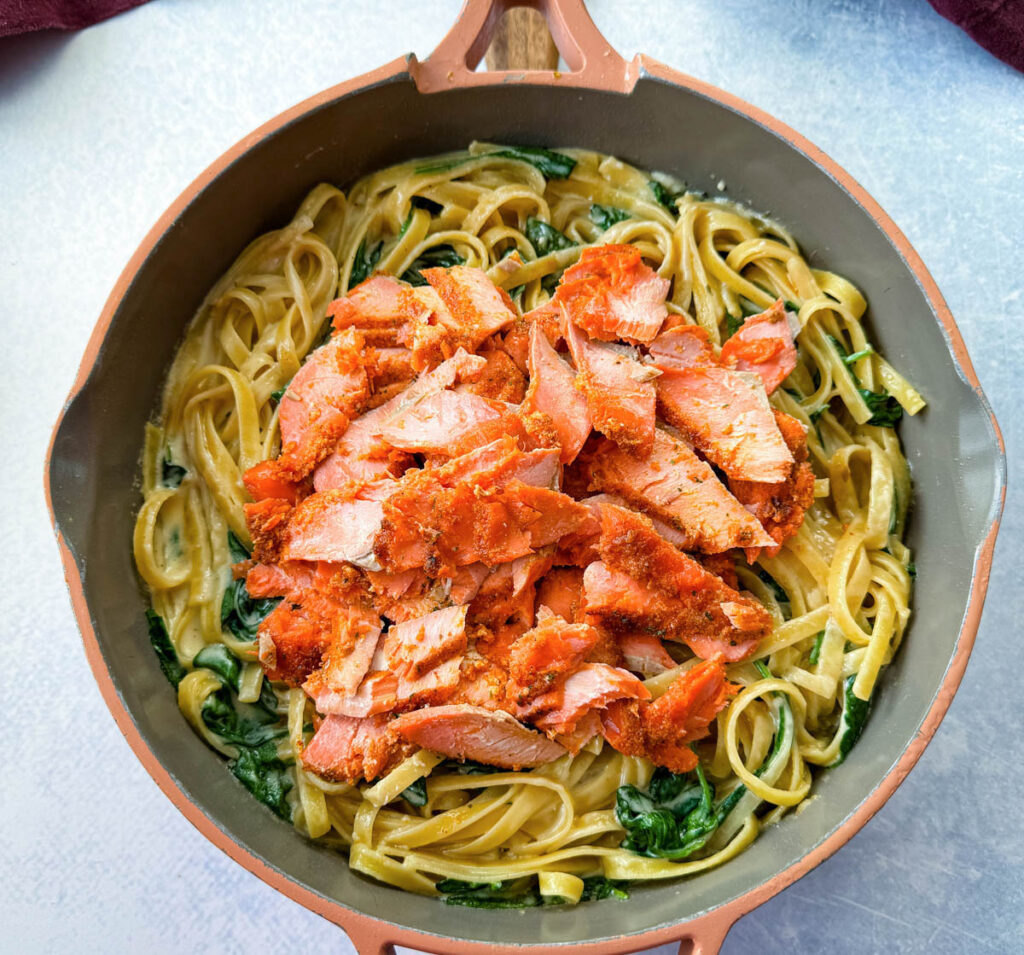
What Type of Pan or Pot to Use
You’ll want to use a large, deep skillet, a wide saucepan, a Dutch oven, or a wide-bottomed pot.
I used this pan from Amazon and this Dutch oven would work, too.
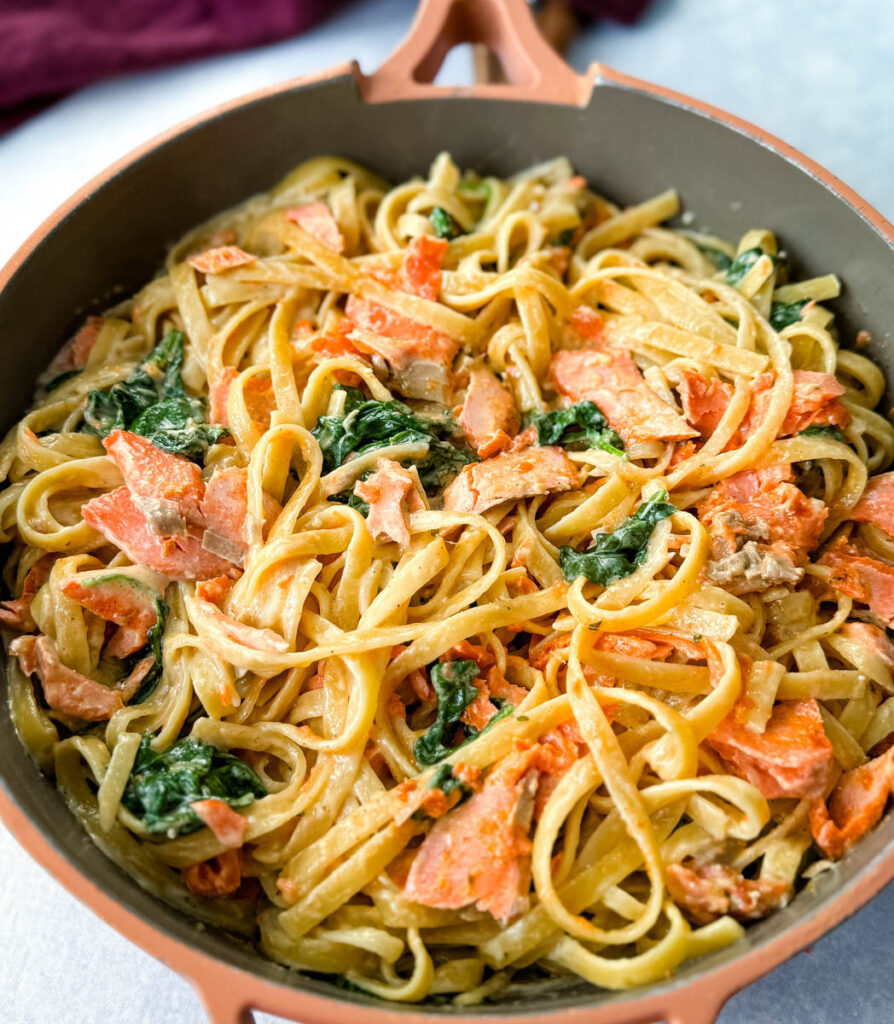
How to Tell When Salmon is Perfectly Cooked
- Temperature: Use a meat thermometer and ensure the fish has reached an internal temperature of 145 degrees. Check the temperature in the thickest part of the fish.
- Appearance and Touch: Perfectly cooked salmon will have a light pink color and will be opaque throughout. The flesh will also start to flake when pressed with a fork.
- It’s important to note that salmon can be cooked to varying degrees of doneness, some people prefer it cooked through while others prefer it medium-rare at 135 degrees. Decide what works for you.
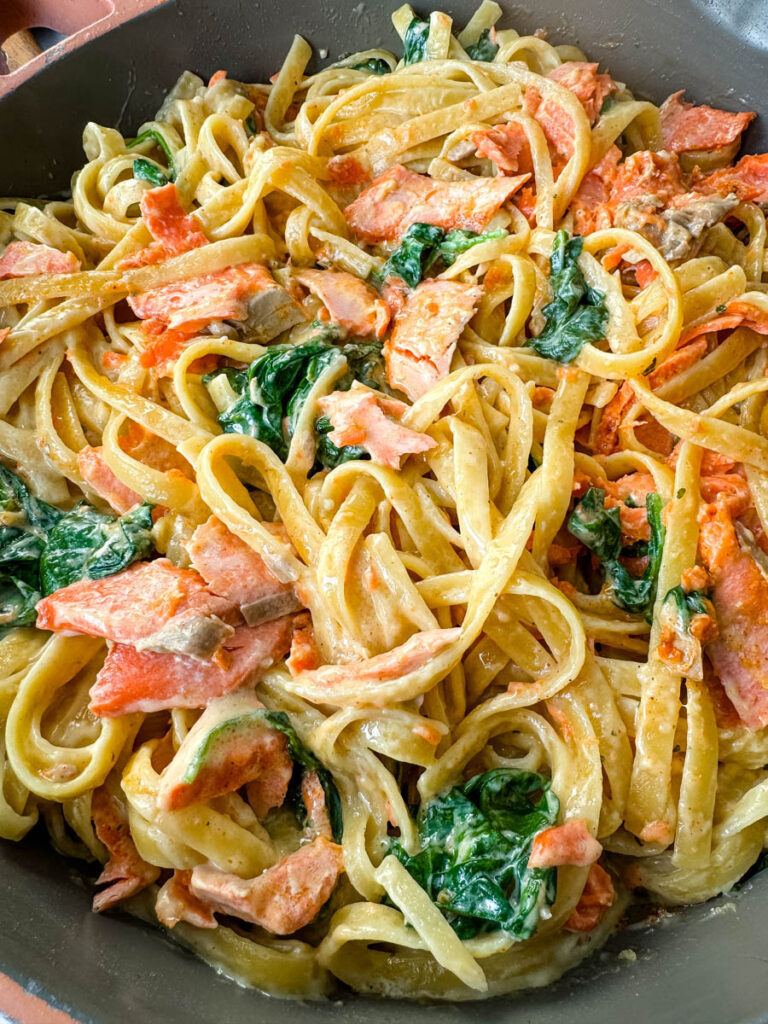
Dry and Overcooked Salmon
Overcooked salmon is dry and has little flavor. Fish (along with meat) will continue to cook when you remove it from heat. This is why it’s important to pay attention to how long the fish cooks.
When the fish is done, it will be a translucent pink in the middle. It should also look flaky.
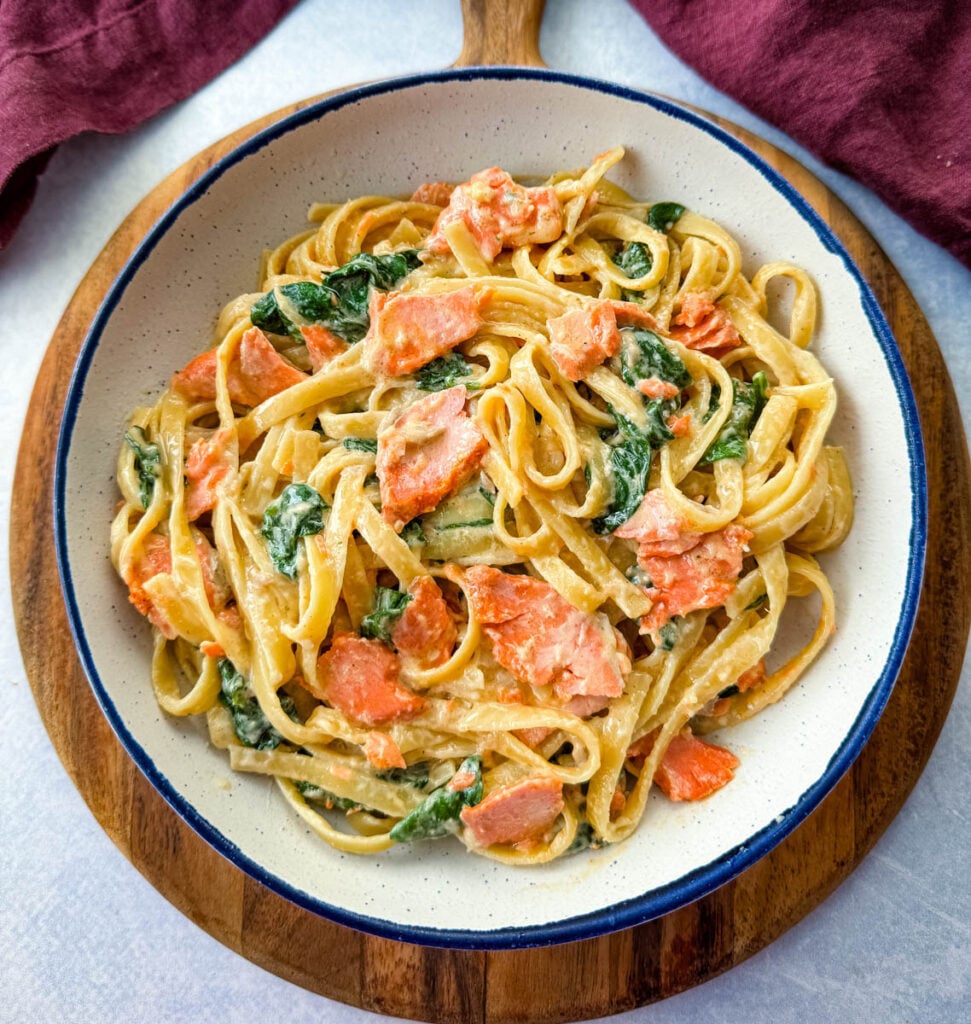
Additional Toppings, Substitutes, and Add-in Ideas
- Shrimp
- Lobster
- Crab
- Grated Parmesan or Pecorino cheese: A classic topping that adds a salty, savory kick.
- Fresh basil or parsley: Chopped herbs bring freshness and a burst of color.
- Red pepper flakes: For a touch of heat and extra flavor.
- Mushrooms: Sliced and sautéed mushrooms pair wonderfully.
- Tomatoes: Diced tomatoes or cherry tomatoes can add freshness and acidity.
- Olives: Sliced black or green olives can introduce a briny element.
- Sun-dried tomatoes: I love these for an intense, concentrated flavor.
- Artichoke hearts: Canned or marinated artichoke hearts offer a unique tangy taste.
- Capers: These can add a hint of saltiness.
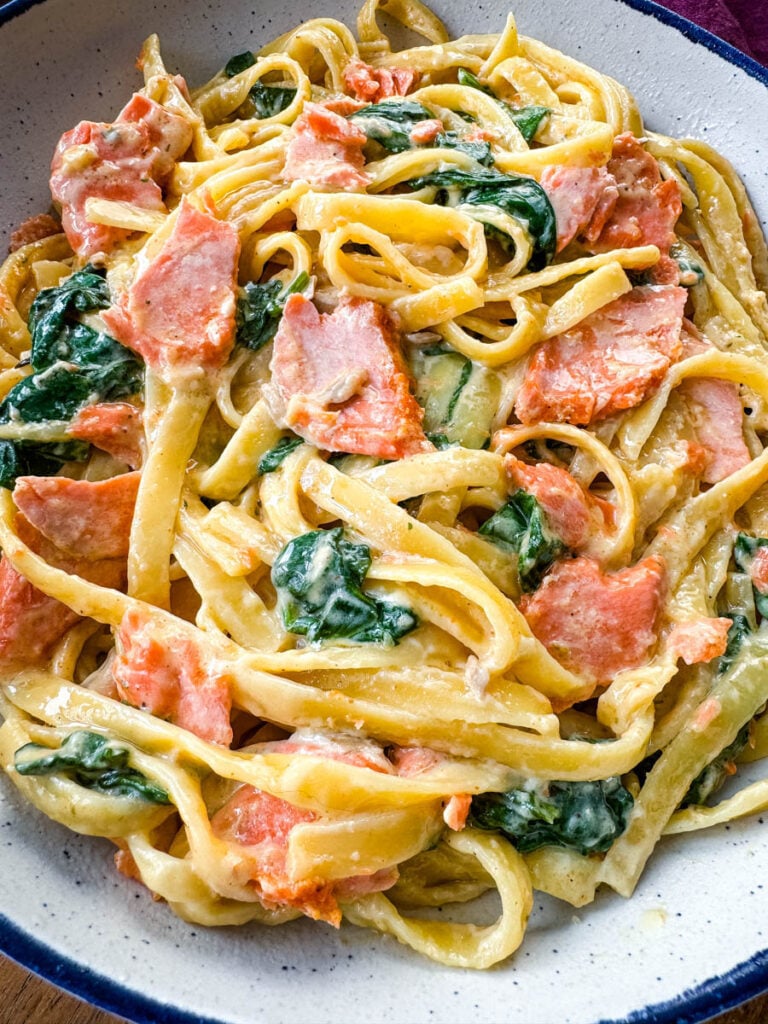
How to Keep it From Drying Out
- Use thin pasta like spaghetti if you know you like your pasta really creamy.
- Avoid overcooking the salmon. Cook it just until it flakes easily with a fork. Overcooked salmon tends to be dry and less flavorful.
- Serve the salmon pasta immediately after preparation. Pasta dishes with creamy sauces are best enjoyed fresh, as they can dry out over time. (Or use the tips below for reheating).
How to Store
Leftovers can be stored tightly covered and sealed in the fridge for 3-4 days.
How to Reheat
Reheating the sauce can be challenging because it may break or become clumpy if it’s not reheated properly. Alfredo sauce thickens as it cools, especially Fettuccine. If you want a creamy texture for your leftovers you will need to add broth, cream, or milk to adjust the consistency when reheating.
I use broth because that won't add many calories or much fat to the already prepared dish. If you know you like it super creamy, reheat it with cream or milk.
Heat the leftovers gently while stirring, and gradually add a small amount of cream to bring it back to the desired consistency. Continue to stir until it’s smooth.
The best way to reheat is on the stove at medium-high heat. Constantly stir until warm.
You can use the microwave but with caution. Use short intervals like 15 to 30 seconds at a time. Overheating will cause the dish to dry out.
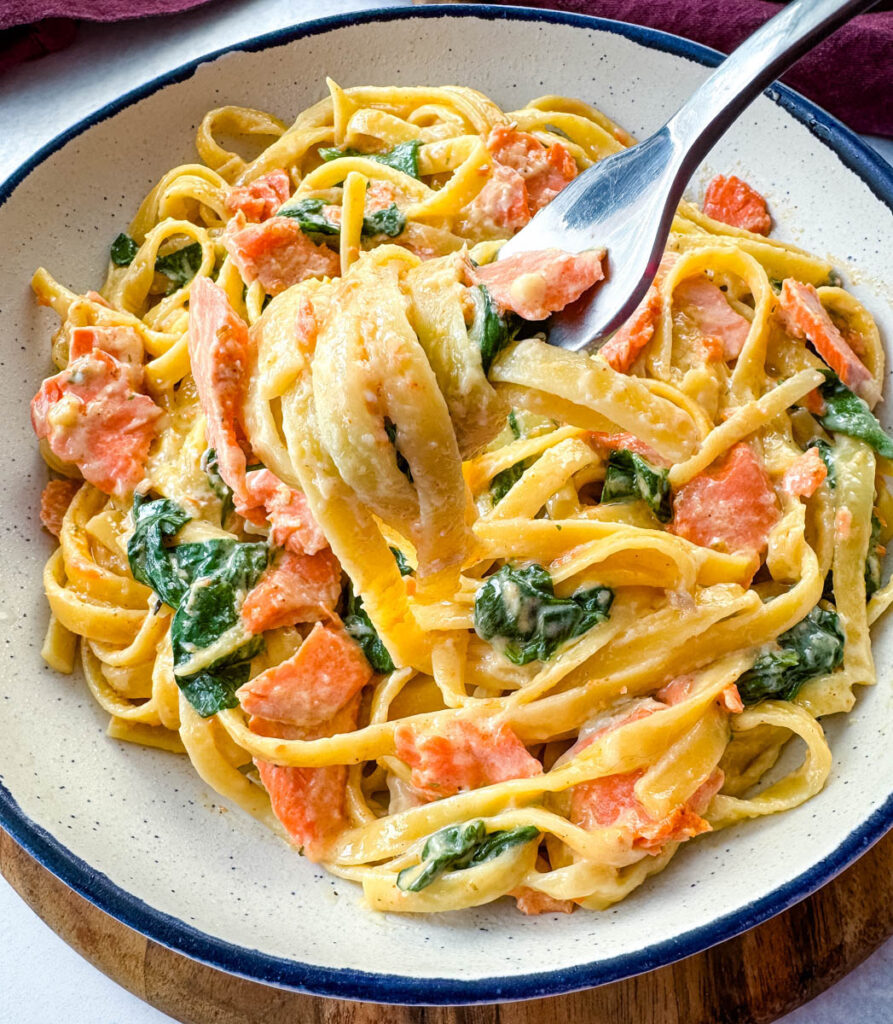
Freezer Tips
You can freeze the dish for up to a couple of months. Defrost in the fridge overnight and follow the steps above to reheat.
Pair With These Recipes
Air Fryer Garlic Bread
Fried Potatoes and Onions
Air Fryer Green Beans
More Seafood Recipes
Crispy Catfish Nuggets
Shrimp Stir Fry with Noodles
Crab Risotto
Shrimp Spaghetti
Old Bay Steamed Shrimp
You can find more easy dinner recipe with these Mediterranean Diet Recipes.
Watch step by step instructions on how to make this recipe here on Youtube.
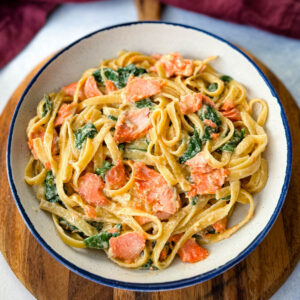
Salmon Fettuccine Alfredo
Want to save this recipe for later?
Ingredients
Salmon
- 1 teaspoon olive oil
- 1-1 ½ pounds raw salmon
- ½ teaspoon garlic powder
- ½ teaspoon onion powder
- ½ teaspoon smoked paprika Regular paprika is fine.
- salt and pepper to taste
Pasta
- 3-4 garlic cloves Minced.
- 1-2 cups chicken broth
- 1 cup heavy whipping cream
- ½ teaspoon Italian Seasoning
- salt and pepper to taste
- 8 oz fettuccine pasta
- 1 ½ cups grated parmesan cheese
- 2-4 cups fresh spinach Optional
Instructions
- Drizzle olive oil all over the salmon. Sprinkle the spices throughout and rub them into the salmon. Ensure the salmon is completely covered with spices and add additional if necessary.
No Boil Pasta Method
- Place a large skillet or pot on the stove at medium-high heat. Add the garlic and cook for 1-2 minutes or until fragrant. Add a small amount of oil (any oil) if not using a nonstick pan.
- Add the broth, spices, and heavy cream to the pot. Start with 1 cup of broth. Taste the sauce repeatedly and add salt and additional spices as necessary to suit your taste.
- Once the mixture begins to boil and bubble add in the pasta. The pasta should wilt down without the need to break it.
- Once the pasta has wilted and is fully covered in the sauce, adjust the heat to medium and cover the pot. If the pasta isn’t completely submerged in sauce, add additional broth as needed.
- Simmer the pasta for 10-15 minutes or until the pasta is al dente.
- Sprinkle in the Parmesan cheese and optional spinach. Fold to combine.
Air Fryer Salmon
- Spray the air fryer basket with cooking oil. Place the seasoned salmon in the air fryer basket.
- Air fry the salmon for 10-12 minutes at 370 degrees. Mine was ready right at 10 minutes. Use a meat thermometer and test that the inside of the salmon has reached 145 degrees.
Baked Salmon
- Preheat oven to 400 degrees.
- Add the seasoned salmon to a piece of foil large enough to hold the salmon and to wrap and cover it.
- Bake for 10 minutes.
- Unwrap the salmon so it is no longer fully covered. Bake for for another 2-5 minutes. Use a meat thermometer and ensure the fish has reached an internal temperature of 145 degrees. Check the temperature in the thickest part of the fish.
Pan Seared Salmon
- Place a skillet on medium-high heat with olive oil to coat and prevent sticking.
- When the pan is hot, add the seasoned salmon to the pan with the skin side up.
- Allow the salmon to cook for 4 minutes. Do not move the salmon after you have placed it in the skillet.
- Monitor the sides of the salmon to determine the perfect time to flip. When the color of the side of the salmon has lightened about ¾ths of the way up, it's time to flip. This usually only takes 3-4 minutes.
- Flip the salmon. I find a silicone spatula works best.
- Cook skin side down for 4 minutes.
- Remove the salmon from the pan.
Assembly
- Add the cooked salmon to the pasta and sauce. Fold to combine the ingredients.
Notes
Nutrition
Nutrition Data
Macros are provided as a courtesy and should not be construed as a guarantee. This information is calculated using MyFitnessPal.com. To obtain the most accurate nutritional information in a given recipe, you should calculate the nutritional information with the actual ingredients used in your recipe, using your preferred nutrition calculator. You are solely responsible for ensuring that any nutritional information provided is accurate, complete, and useful.

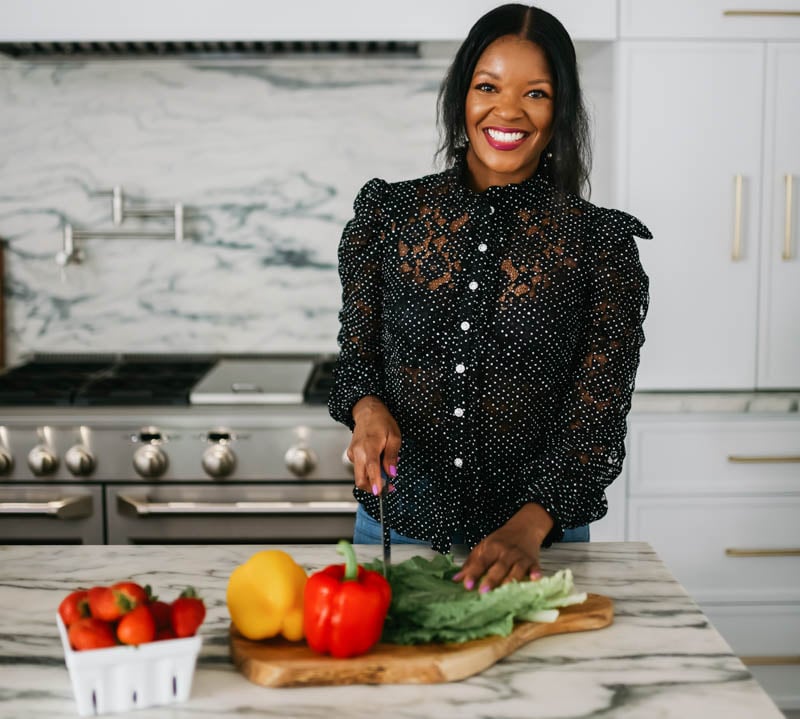
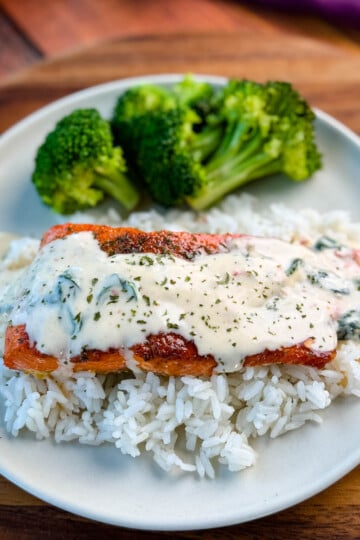
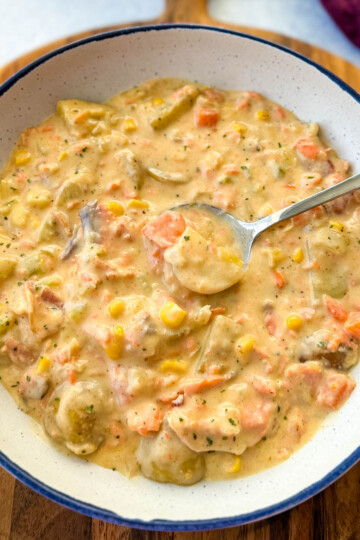
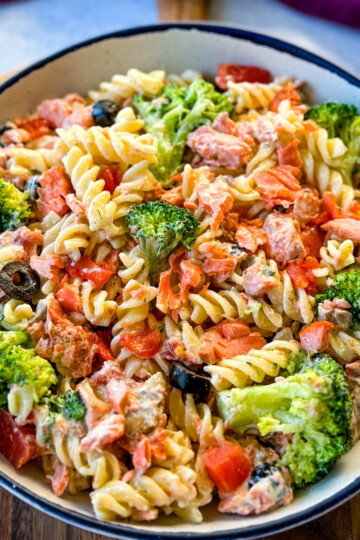
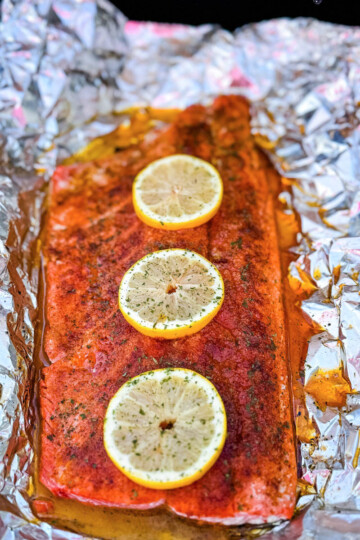
Jessie says
I love the no boil method. I rarely make pasta because it's daunting. This turned out great.
staysnatched says
That trick does it every time!